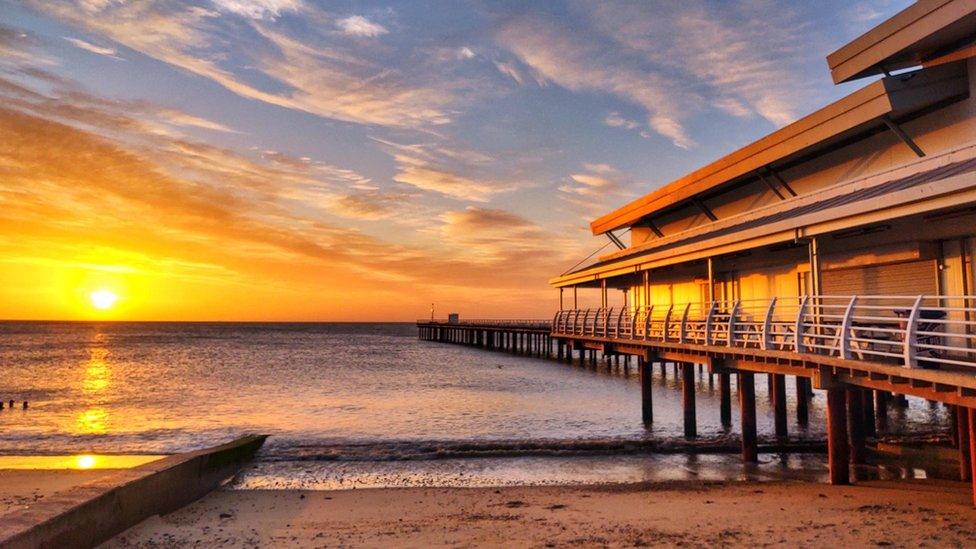UK weather: Why January 2022 was a record breaker
- Published

The pier in Felixstowe, Suffolk, basks in a golden sunrise
Although 2022 is still only really getting going, January has been a month of chart-busting weather in the UK. Some will remember it for record-breaking temperatures, sunshine levels and a noticeable lack of rain, but for others it was almost the opposite, with endless cloudy days and ending with a duo of severe storms.
The year began with the UK having the warmest New Year's Day on record as reached 16.3C. The previous New Year's Day record was set in 1916, when it reached 15.6C in Bude, Cornwall.
Warm air from the Azores had brought unusually mild weather.
January blue skies over Marske-by-the-Sea, North Yorkshire
The Met Office has also confirmed it was the sunniest January on record for England with a total of 80.7 hours, beating the previous record of 77.5 in 1959. It is also the third sunniest January on record for the UK, with 1959 remaining in the top spot with 69.7 hours.
The UK's record breaking January sunny spots
Boulmer in Northumberland notched up 116.1 hours last month, almost double its normal January sunshine amount, with Weybourne in Norfolk, Waddington in Lincolnshire, and Wattisham in Suffolk, all breaking their sunshine records too.
However, in contrast, parts of north-west Scotland had less than 20 hours of sunshine through the whole month.
Scotland overall though had a mild month, with a mean temperature of 4.7Β°C, putting it as the country's sixth warmest January on record.
Rainfall totals around the UK for January 2022
Rainfall has also been in short supply in some locations. Both East Anglia and the area covering the east and north-east of England ended up with their fifth driest January on record with 16.4mm and 23.8mm respectively.
The rainfall total for England and Wales up to 29 January reached 34mm, which is . Though it doesn't even make the top 20 record-wise, with a long way to go to beat the 1766 low of 4.4mm.
With recent rain in Scotland, that figure is now more than 50% but not by very much.
Huge waves crashing over the barrier near houses in Inverclyde
Destructive storms Malik and Corrie brought gusts in excess of 90mph and a very sobering end to the month. Two people died in Staffordshire and Aberdeen and thousands of homes in Scotland and England were left without power.
Βι¶ΉΤΌΕΔ Weather forecaster Matt Taylor said: "It was the unusual persistence of high pressure close to the UK that caused January to be so dry and sunny for many.
"With January climatologically one of the wettest months of the year it may mean that some of our reservoirs and groundwater aquifers haven't got the water recharge they'd traditionally get. If the predominantly dry story persists, we may find ourselves hoping a for a wet Spring to readdress the balance."
The stormy conditions over the weekend, however, did make for .
- Published31 January 2022
- Published28 January 2022
- Published27 January 2022